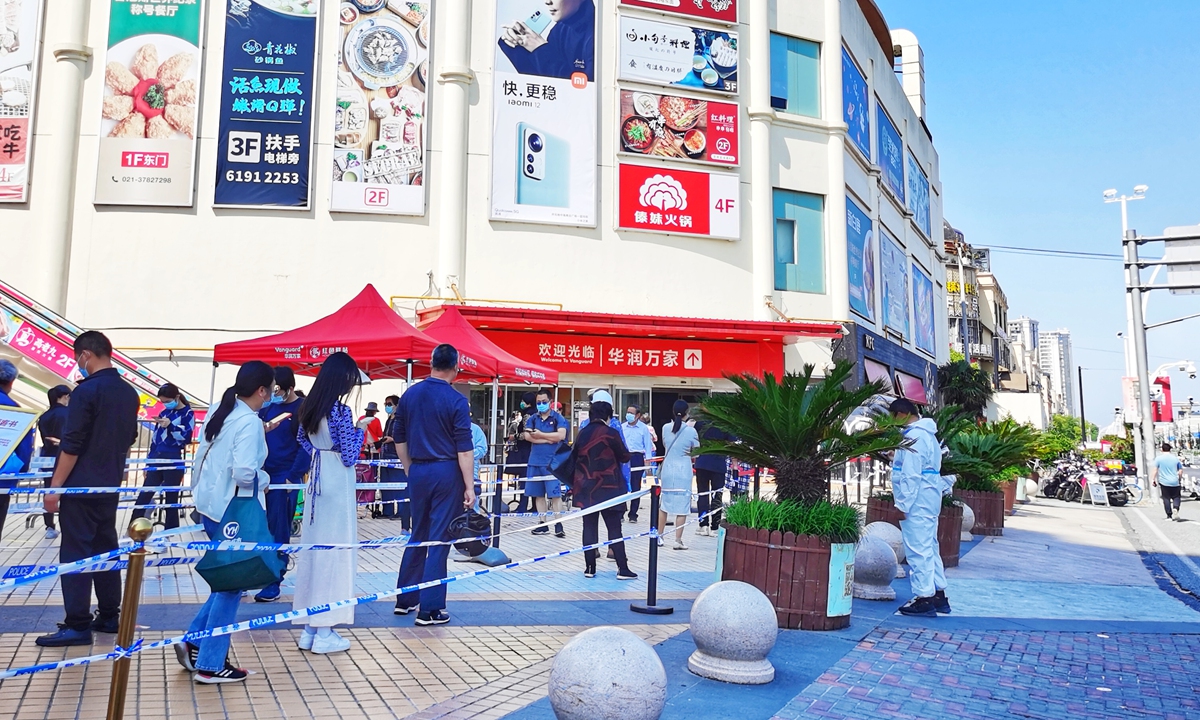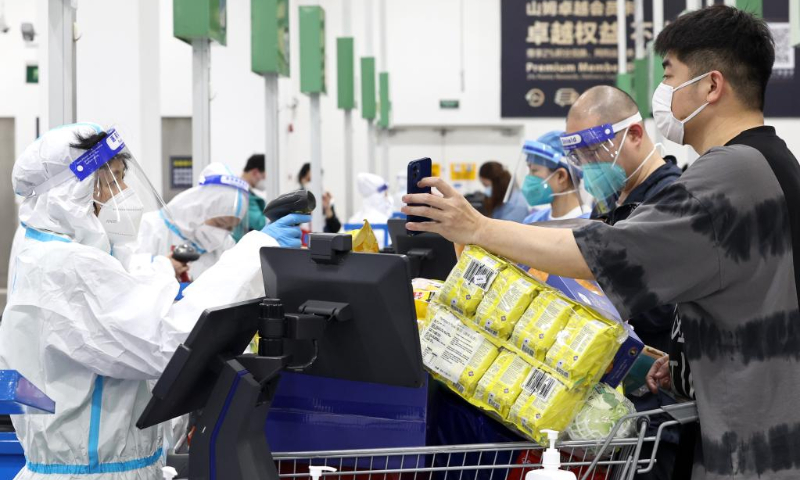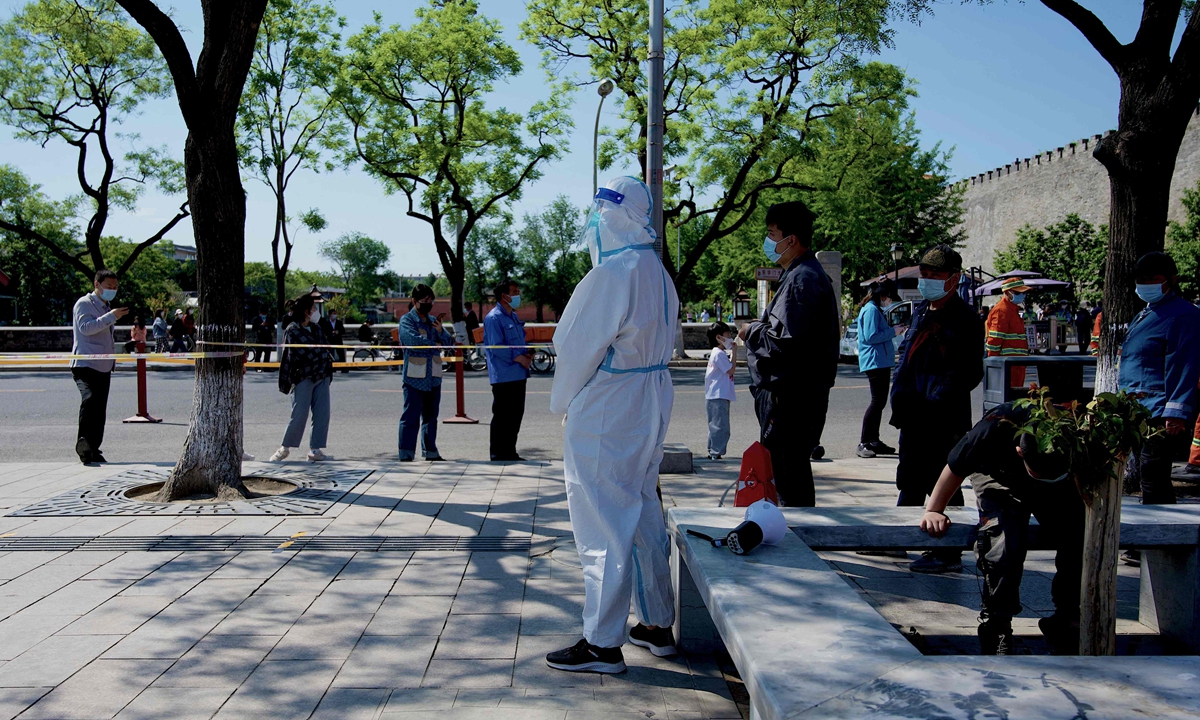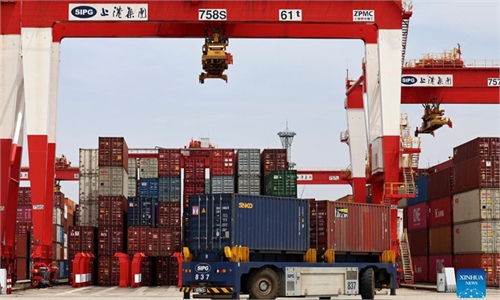
People queue up to enter a supermarket in Songjiang district, Shanghai, on May 6, 2022. Several supermarkets in the district have reopened as the epidemic in the district eases. Photo: VCG
A day after a CPC top leadership meeting warned against attempts to distort, question or dismiss China's anti-COVID policy, Shanghai on Friday vowed to stick to the dynamic zero-COVID strategy and push forward the decisive battle against the epidemic.
While the epidemic in Shanghai has been effectively curbed, analysts warned against a lack of vigilance and slackness. They believe cities across the nation should learn lessons from this round of flare-ups, make emergency plans in advance and timely adjust prevention measures to ensure dynamic zero policy.
The anti-virus work in Shanghai is in a crucial period and should not allow any slackness, Shanghai's executive vice mayor Wu Qing told a press conference on Friday, noting that the city will further study the spirit of the meeting of the Standing Committee of the Political Bureau of the Communist Party of China (CPC) Central Committee on Thursday, unswervingly adhering to the dynamic zero-COVID policy.
The Thursday meeting, which was chaired by Xi Jinping, general secretary of the CPC Central Committee, stressed the need to accelerate the pace of control work to deal with sporadic outbreaks.
It also warned against any slackening in the control efforts, stated the importance of unswervingly adhering to the dynamic zero-COVID policy and resolutely fighting any attempts to distort, question or dismiss China's anti-COVID policy.
Hours after the CPC top leadership meeting on Thursday, the standing committee of CPC Shanghai municipal committee held a meeting chaired by Shanghai Party chief Li Qiang and vowed to implement the prevention policy and made more detailed working plans, including greatly improving the capability on nucleic acid tests.
The CPC top leadership meeting came when China is fighting a new round of flare-ups with Shanghai being hit the hardest and other cities, including Beijing, implementing strict anti-virus measures.
Compared to previous weeks, the situation in many cities is turning better. From April 30 to May 5, China reported 5,800 new daily infections on average, down 80 percent from the peak. China's epidemic prevention and control situation stabilized during May, with 21 provincial-level regions now classified as low-risk areas, health authorities told a press conference on Friday.
Liang Wannian, China's head of the COVID response expert panel under the National Health Commission, also said at the press conference that pursuing dynamic zero-COVID policy does not mean citywide lockdowns, on the contrary, one of the goals for zero-COVID policy is to avoid citywide lockdowns as much as possible.

Customers check out at a Sam's Club warehouse store at Beicai Town in Pudong New Area, east China's Shanghai, May 2, 2022. Large retail companies in Shanghai have started to reopen their supermarkets amid the recent COVID-19 resurgence. Photo:Xinhua
Fighting against slackness
Shanghai on Friday reported 245 local COVID-19 confirmed cases and 4,024 local asymptomatic infections. The city has kept the Rt value at below 1.0 for more than 10 consecutive days, and has showed a declining trend of newly reported positive cases for two weeks. The epidemic in Shanghai has been effectively curbed and the situation is stable and improving, according to Shanghai authorities.
However, the decline in the number of new positive infections in a single day was relatively small, and there were still reports of positive cases at the community level, indicating the risk of a rebound of the epidemic, Wu said at Friday's press briefing, noting that the task of prevention and control remains arduous in key areas and groups and decisive measures should be continued.
"An Rt of less than 1.0 means the number of new infections is decreasing, which shows a close approach to the zero-COVID status at the community level," Lu Hongzhou, head of Shenzhen's anti-epidemic expert team and head of the Third People's Hospital of Shenzhen, told the Global Times on Friday. Rt refers to the reproduction number at a particular point in time.
Due to the nature of Omicron with fast and hidden transmissions, we should take preventive and effective measures the first time it is detected, Lu said, noting that high-frequency nucleic acid tests can be one of the measures to detect the positive cases earlier.
Lu also suggested a scientific mechanism needed in Shanghai to support the city returning to normal such as the application of venue health codes to check residents' nucleic acid status to ensure positive cases are found as early as possible. The focus now is to prevent a resurgence among communities and to guarantee residents' daily necessities.
To win the decisive battle against the epidemic in the crucial period, Wu also listed prevention measures the city will continue to implement, including focusing on old residential areas, urban villages, construction sites, nursing homes and other key places and groups to detect positive cases in a timely manner, and mass screenings of nucleic acid and antigen tests to spot infections as soon as possible.
Given the declining daily new infections, other experts reached by the Global Times predicted that the outbreak in Shanghai may be fully controlled by the end of May.
A model developed by Yao Maosheng, a professor at the College of Environmental Sciences and Engineering at Peking University, showed that new infections will drop below 1,000 around May 19. By the end of May, the current infection wave in Shanghai is likely to be contained, and the city will gradually lift the lockdowns by then.
Despite the hopeful expectations, more experts urged cities in China to draw lessons from this round of flare-up and improve the implementation of the prevention measures.
A senior expert at the Chinese Center for Disease Control and Prevention who requested anonymity told the Global Times that Shanghai's achievements in taming the previous COVID-19 outbreaks before the Omicron variant was widely recognized and its targeted measures have been proven to be effective. But the financial hub was not prepared for the wide spread of Omicron, which spread more than twice as fast as Delta.
Shanghai's epidemic prevention and control was adjusted from targeted measures to large-scale lockdowns, when the city did not prepare an emergency plan for Omicron, and this also caused coordination problems in food supply and medical needs to residents under lockdown, the expert said, noting that one big lesson Shanghai learned this time was how to fully guarantee the medical needs of non-COVID patients.
The expert stressed that the virus is constantly mutating, and it's expected that there will be variants that are more contagious than Omicron, which will significantly increase the risks of the "city's defensive line being broken through."

People queue for a swab test to be tested for the Covid-19 coronavirus near the entrance of the Forbidden City in Beijing on May 1, 2022. Photo: CFP
On Thursday night, the top CPC leadership meeting also warned against any slackening in the control efforts. It noted that Party committees, governments and society must guard against a lack of vigilance, fully mobilize the people, and take fast action to implement various COVID-19 control measures and policies in a concrete and meticulous manner.
The meeting also highlighted measures to ensure people's livelihood and everyday supplies, meet people's needs for medical services, and release information on a regular basis to address public concerns.
The supply of food and daily necessities in Shanghai had once been a huge public concern among the residents since the city announced a "layered" management. Analysts noted that cities should learn from Shanghai's response to fully prepare for future stronger variants, and be better prepared on medical resources reserve and food supply.
The anonymous expert also noted that governments should also ensure transparent, timely and open communication with residents, as the COVID-19 policy requires the understanding and cooperation of all residents.
Chinese cities have been summarizing lessons and experiences from other cities' COVID-19 response, as many have introduced stricter measures when cases showed signs of increasing, and came up with regular nucleic acid testing to timely discover infections, he said.
All the precious experiences drawn from fighting the virus will improve China's prevention measures, helping the country better realize its dynamic zero-COVID-19 policy and this is why China has the confidence to win the war against COVID-19, said analysts.



